#Kubernetes deployment solutions
Explore tagged Tumblr posts
Text
Best Kubernetes Management Tools in 2023
Best Kubernetes Management Tools in 2023 #homelab #vmwarecommunities #Kubernetesmanagementtools2023 #bestKubernetescommandlinetools #managingKubernetesclusters #Kubernetesdashboardinterfaces #kubernetesmanagementtools #Kubernetesdashboard
Kubernetes is everywhere these days. It is used in the enterprise and even in many home labs. It’s a skill that’s sought after, especially with today’s push for app modernization. Many tools help you manage things in Kubernetes, like clusters, pods, services, and apps. Here’s my list of the best Kubernetes management tools in 2023. Table of contentsWhat is Kubernetes?Understanding Kubernetes and…
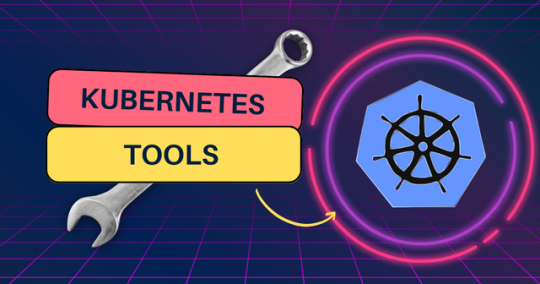
View On WordPress
#best Kubernetes command line tools#containerized applications management#Kubernetes cluster management tools#Kubernetes cost monitoring#Kubernetes dashboard interfaces#Kubernetes deployment solutions#Kubernetes management tools 2023#large Kubernetes deployments#managing Kubernetes clusters#open-source Kubernetes tools
0 notes
Text
Ready to future-proof your applications and boost performance? Discover how PHP microservices can transform your development workflow! 💡
In this powerful guide, you'll learn: ✅ What PHP Microservices Architecture really means ✅ How to break a monolithic app into modular services ✅ Best tools for containerization like Docker & Kubernetes ✅ API Gateway strategies and service discovery techniques ✅ Tips on error handling, security, and performance optimization
With real-world examples and practical steps, this guide is perfect for developers and teams aiming for faster deployment, independent scaling, and simplified maintenance.
🎯 Whether you’re a solo developer or scaling a product, understanding microservices is the key to next-level architecture.
🌐 Brought to you by Orbitwebtech, Best Web Development Company in the USA, helping businesses build powerful and scalable web solutions.
📖 Start reading now and give your PHP projects a cutting-edge upgrade!
2 notes
·
View notes
Text
Exploring the Azure Technology Stack: A Solution Architect’s Journey
Kavin
As a solution architect, my career revolves around solving complex problems and designing systems that are scalable, secure, and efficient. The rise of cloud computing has transformed the way we think about technology, and Microsoft Azure has been at the forefront of this evolution. With its diverse and powerful technology stack, Azure offers endless possibilities for businesses and developers alike. My journey with Azure began with Microsoft Azure training online, which not only deepened my understanding of cloud concepts but also helped me unlock the potential of Azure’s ecosystem.
In this blog, I will share my experience working with a specific Azure technology stack that has proven to be transformative in various projects. This stack primarily focuses on serverless computing, container orchestration, DevOps integration, and globally distributed data management. Let’s dive into how these components come together to create robust solutions for modern business challenges.

Understanding the Azure Ecosystem
Azure’s ecosystem is vast, encompassing services that cater to infrastructure, application development, analytics, machine learning, and more. For this blog, I will focus on a specific stack that includes:
Azure Functions for serverless computing.
Azure Kubernetes Service (AKS) for container orchestration.
Azure DevOps for streamlined development and deployment.
Azure Cosmos DB for globally distributed, scalable data storage.
Each of these services has unique strengths, and when used together, they form a powerful foundation for building modern, cloud-native applications.
1. Azure Functions: Embracing Serverless Architecture
Serverless computing has redefined how we build and deploy applications. With Azure Functions, developers can focus on writing code without worrying about managing infrastructure. Azure Functions supports multiple programming languages and offers seamless integration with other Azure services.
Real-World Application
In one of my projects, we needed to process real-time data from IoT devices deployed across multiple locations. Azure Functions was the perfect choice for this task. By integrating Azure Functions with Azure Event Hubs, we were able to create an event-driven architecture that processed millions of events daily. The serverless nature of Azure Functions allowed us to scale dynamically based on workload, ensuring cost-efficiency and high performance.
Key Benefits:
Auto-scaling: Automatically adjusts to handle workload variations.
Cost-effective: Pay only for the resources consumed during function execution.
Integration-ready: Easily connects with services like Logic Apps, Event Grid, and API Management.
2. Azure Kubernetes Service (AKS): The Power of Containers
Containers have become the backbone of modern application development, and Azure Kubernetes Service (AKS) simplifies container orchestration. AKS provides a managed Kubernetes environment, making it easier to deploy, manage, and scale containerized applications.
Real-World Application
In a project for a healthcare client, we built a microservices architecture using AKS. Each service—such as patient records, appointment scheduling, and billing—was containerized and deployed on AKS. This approach provided several advantages:
Isolation: Each service operated independently, improving fault tolerance.
Scalability: AKS scaled specific services based on demand, optimizing resource usage.
Observability: Using Azure Monitor, we gained deep insights into application performance and quickly resolved issues.
The integration of AKS with Azure DevOps further streamlined our CI/CD pipelines, enabling rapid deployment and updates without downtime.
Key Benefits:
Managed Kubernetes: Reduces operational overhead with automated updates and patching.
Multi-region support: Enables global application deployments.
Built-in security: Integrates with Azure Active Directory and offers role-based access control (RBAC).
3. Azure DevOps: Streamlining Development Workflows
Azure DevOps is an all-in-one platform for managing development workflows, from planning to deployment. It includes tools like Azure Repos, Azure Pipelines, and Azure Artifacts, which support collaboration and automation.
Real-World Application
For an e-commerce client, we used Azure DevOps to establish an efficient CI/CD pipeline. The project involved multiple teams working on front-end, back-end, and database components. Azure DevOps provided:
Version control: Using Azure Repos for centralized code management.
Automated pipelines: Azure Pipelines for building, testing, and deploying code.
Artifact management: Storing dependencies in Azure Artifacts for seamless integration.
The result? Deployment cycles that previously took weeks were reduced to just a few hours, enabling faster time-to-market and improved customer satisfaction.
Key Benefits:
End-to-end integration: Unifies tools for seamless development and deployment.
Scalability: Supports projects of all sizes, from startups to enterprises.
Collaboration: Facilitates team communication with built-in dashboards and tracking.

4. Azure Cosmos DB: Global Data at Scale
Azure Cosmos DB is a globally distributed, multi-model database service designed for mission-critical applications. It guarantees low latency, high availability, and scalability, making it ideal for applications requiring real-time data access across multiple regions.
Real-World Application
In a project for a financial services company, we used Azure Cosmos DB to manage transaction data across multiple continents. The database’s multi-region replication ensure data consistency and availability, even during regional outages. Additionally, Cosmos DB’s support for multiple APIs (SQL, MongoDB, Cassandra, etc.) allowed us to integrate seamlessly with existing systems.
Key Benefits:
Global distribution: Data is replicated across regions with minimal latency.
Flexibility: Supports various data models, including key-value, document, and graph.
SLAs: Offers industry-leading SLAs for availability, throughput, and latency.
Building a Cohesive Solution
Combining these Azure services creates a technology stack that is flexible, scalable, and efficient. Here’s how they work together in a hypothetical solution:
Data Ingestion: IoT devices send data to Azure Event Hubs.
Processing: Azure Functions processes the data in real-time.
Storage: Processed data is stored in Azure Cosmos DB for global access.
Application Logic: Containerized microservices run on AKS, providing APIs for accessing and manipulating data.
Deployment: Azure DevOps manages the CI/CD pipeline, ensuring seamless updates to the application.
This architecture demonstrates how Azure’s technology stack can address modern business challenges while maintaining high performance and reliability.
Final Thoughts
My journey with Azure has been both rewarding and transformative. The training I received at ACTE Institute provided me with a strong foundation to explore Azure’s capabilities and apply them effectively in real-world scenarios. For those new to cloud computing, I recommend starting with a solid training program that offers hands-on experience and practical insights.
As the demand for cloud professionals continues to grow, specializing in Azure’s technology stack can open doors to exciting opportunities. If you’re based in Hyderabad or prefer online learning, consider enrolling in Microsoft Azure training in Hyderabad to kickstart your journey.
Azure’s ecosystem is continuously evolving, offering new tools and features to address emerging challenges. By staying committed to learning and experimenting, we can harness the full potential of this powerful platform and drive innovation in every project we undertake.
#cybersecurity#database#marketingstrategy#digitalmarketing#adtech#artificialintelligence#machinelearning#ai
2 notes
·
View notes
Text
Top 10 In- Demand Tech Jobs in 2025

Technology is growing faster than ever, and so is the need for skilled professionals in the field. From artificial intelligence to cloud computing, businesses are looking for experts who can keep up with the latest advancements. These tech jobs not only pay well but also offer great career growth and exciting challenges.
In this blog, we’ll look at the top 10 tech jobs that are in high demand today. Whether you’re starting your career or thinking of learning new skills, these jobs can help you plan a bright future in the tech world.
1. AI and Machine Learning Specialists
Artificial Intelligence (AI) and Machine Learning are changing the game by helping machines learn and improve on their own without needing step-by-step instructions. They’re being used in many areas, like chatbots, spotting fraud, and predicting trends.
Key Skills: Python, TensorFlow, PyTorch, data analysis, deep learning, and natural language processing (NLP).
Industries Hiring: Healthcare, finance, retail, and manufacturing.
Career Tip: Keep up with AI and machine learning by working on projects and getting an AI certification. Joining AI hackathons helps you learn and meet others in the field.
2. Data Scientists
Data scientists work with large sets of data to find patterns, trends, and useful insights that help businesses make smart decisions. They play a key role in everything from personalized marketing to predicting health outcomes.
Key Skills: Data visualization, statistical analysis, R, Python, SQL, and data mining.
Industries Hiring: E-commerce, telecommunications, and pharmaceuticals.
Career Tip: Work with real-world data and build a strong portfolio to showcase your skills. Earning certifications in data science tools can help you stand out.
3. Cloud Computing Engineers: These professionals create and manage cloud systems that allow businesses to store data and run apps without needing physical servers, making operations more efficient.
Key Skills: AWS, Azure, Google Cloud Platform (GCP), DevOps, and containerization (Docker, Kubernetes).
Industries Hiring: IT services, startups, and enterprises undergoing digital transformation.
Career Tip: Get certified in cloud platforms like AWS (e.g., AWS Certified Solutions Architect).
4. Cybersecurity Experts
Cybersecurity professionals protect companies from data breaches, malware, and other online threats. As remote work grows, keeping digital information safe is more crucial than ever.
Key Skills: Ethical hacking, penetration testing, risk management, and cybersecurity tools.
Industries Hiring: Banking, IT, and government agencies.
Career Tip: Stay updated on new cybersecurity threats and trends. Certifications like CEH (Certified Ethical Hacker) or CISSP (Certified Information Systems Security Professional) can help you advance in your career.
5. Full-Stack Developers
Full-stack developers are skilled programmers who can work on both the front-end (what users see) and the back-end (server and database) of web applications.
Key Skills: JavaScript, React, Node.js, HTML/CSS, and APIs.
Industries Hiring: Tech startups, e-commerce, and digital media.
Career Tip: Create a strong GitHub profile with projects that highlight your full-stack skills. Learn popular frameworks like React Native to expand into mobile app development.
6. DevOps Engineers
DevOps engineers help make software faster and more reliable by connecting development and operations teams. They streamline the process for quicker deployments.
Key Skills: CI/CD pipelines, automation tools, scripting, and system administration.
Industries Hiring: SaaS companies, cloud service providers, and enterprise IT.
Career Tip: Earn key tools like Jenkins, Ansible, and Kubernetes, and develop scripting skills in languages like Bash or Python. Earning a DevOps certification is a plus and can enhance your expertise in the field.
7. Blockchain Developers
They build secure, transparent, and unchangeable systems. Blockchain is not just for cryptocurrencies; it’s also used in tracking supply chains, managing healthcare records, and even in voting systems.
Key Skills: Solidity, Ethereum, smart contracts, cryptography, and DApp development.
Industries Hiring: Fintech, logistics, and healthcare.
Career Tip: Create and share your own blockchain projects to show your skills. Joining blockchain communities can help you learn more and connect with others in the field.
8. Robotics Engineers
Robotics engineers design, build, and program robots to do tasks faster or safer than humans. Their work is especially important in industries like manufacturing and healthcare.
Key Skills: Programming (C++, Python), robotics process automation (RPA), and mechanical engineering.
Industries Hiring: Automotive, healthcare, and logistics.
Career Tip: Stay updated on new trends like self-driving cars and AI in robotics.
9. Internet of Things (IoT) Specialists
IoT specialists work on systems that connect devices to the internet, allowing them to communicate and be controlled easily. This is crucial for creating smart cities, homes, and industries.
Key Skills: Embedded systems, wireless communication protocols, data analytics, and IoT platforms.
Industries Hiring: Consumer electronics, automotive, and smart city projects.
Career Tip: Create IoT prototypes and learn to use platforms like AWS IoT or Microsoft Azure IoT. Stay updated on 5G technology and edge computing trends.
10. Product Managers
Product managers oversee the development of products, from idea to launch, making sure they are both technically possible and meet market demands. They connect technical teams with business stakeholders.
Key Skills: Agile methodologies, market research, UX design, and project management.
Industries Hiring: Software development, e-commerce, and SaaS companies.
Career Tip: Work on improving your communication and leadership skills. Getting certifications like PMP (Project Management Professional) or CSPO (Certified Scrum Product Owner) can help you advance.
Importance of Upskilling in the Tech Industry
Stay Up-to-Date: Technology changes fast, and learning new skills helps you keep up with the latest trends and tools.
Grow in Your Career: By learning new skills, you open doors to better job opportunities and promotions.
Earn a Higher Salary: The more skills you have, the more valuable you are to employers, which can lead to higher-paying jobs.
Feel More Confident: Learning new things makes you feel more prepared and ready to take on tougher tasks.
Adapt to Changes: Technology keeps evolving, and upskilling helps you stay flexible and ready for any new changes in the industry.
Top Companies Hiring for These Roles
Global Tech Giants: Google, Microsoft, Amazon, and IBM.
Startups: Fintech, health tech, and AI-based startups are often at the forefront of innovation.
Consulting Firms: Companies like Accenture, Deloitte, and PwC increasingly seek tech talent.
In conclusion, the tech world is constantly changing, and staying updated is key to having a successful career. In 2025, jobs in fields like AI, cybersecurity, data science, and software development will be in high demand. By learning the right skills and keeping up with new trends, you can prepare yourself for these exciting roles. Whether you're just starting or looking to improve your skills, the tech industry offers many opportunities for growth and success.
#Top 10 Tech Jobs in 2025#In- Demand Tech Jobs#High paying Tech Jobs#artificial intelligence#datascience#cybersecurity
2 notes
·
View notes
Text
Top Trends in Software Development for 2025
The software development industry is evolving at an unprecedented pace, driven by advancements in technology and the increasing demands of businesses and consumers alike. As we step into 2025, staying ahead of the curve is essential for businesses aiming to remain competitive. Here, we explore the top trends shaping the software development landscape and how they impact businesses. For organizations seeking cutting-edge solutions, partnering with the Best Software Development Company in Vadodara, Gujarat, or India can make all the difference.

1. Artificial Intelligence and Machine Learning Integration:
Artificial Intelligence (AI) and Machine Learning (ML) are no longer optional but integral to modern software development. From predictive analytics to personalized user experiences, AI and ML are driving innovation across industries. In 2025, expect AI-powered tools to streamline development processes, improve testing, and enhance decision-making.
Businesses in Gujarat and beyond are leveraging AI to gain a competitive edge. Collaborating with the Best Software Development Company in Gujarat ensures access to AI-driven solutions tailored to specific industry needs.
2. Low-Code and No-Code Development Platforms:
The demand for faster development cycles has led to the rise of low-code and no-code platforms. These platforms empower non-technical users to create applications through intuitive drag-and-drop interfaces, significantly reducing development time and cost.
For startups and SMEs in Vadodara, partnering with the Best Software Development Company in Vadodara ensures access to these platforms, enabling rapid deployment of business applications without compromising quality.
3. Cloud-Native Development:
Cloud-native technologies, including Kubernetes and microservices, are becoming the backbone of modern applications. By 2025, cloud-native development will dominate, offering scalability, resilience, and faster time-to-market.
The Best Software Development Company in India can help businesses transition to cloud-native architectures, ensuring their applications are future-ready and capable of handling evolving market demands.
4. Edge Computing:
As IoT devices proliferate, edge computing is emerging as a critical trend. Processing data closer to its source reduces latency and enhances real-time decision-making. This trend is particularly significant for industries like healthcare, manufacturing, and retail.
Organizations seeking to leverage edge computing can benefit from the expertise of the Best Software Development Company in Gujarat, which specializes in creating applications optimized for edge environments.
5. Cybersecurity by Design:
With the increasing sophistication of cyber threats, integrating security into the development process has become non-negotiable. Cybersecurity by design ensures that applications are secure from the ground up, reducing vulnerabilities and protecting sensitive data.
The Best Software Development Company in Vadodara prioritizes cybersecurity, providing businesses with robust, secure software solutions that inspire trust among users.
6. Blockchain Beyond Cryptocurrencies:
Blockchain technology is expanding beyond cryptocurrencies into areas like supply chain management, identity verification, and smart contracts. In 2025, blockchain will play a pivotal role in creating transparent, tamper-proof systems.
Partnering with the Best Software Development Company in India enables businesses to harness blockchain technology for innovative applications that drive efficiency and trust.
7. Progressive Web Apps (PWAs):
Progressive Web Apps (PWAs) combine the best features of web and mobile applications, offering seamless experiences across devices. PWAs are cost-effective and provide offline capabilities, making them ideal for businesses targeting diverse audiences.
The Best Software Development Company in Gujarat can develop PWAs tailored to your business needs, ensuring enhanced user engagement and accessibility.
8. Internet of Things (IoT) Expansion:
IoT continues to transform industries by connecting devices and enabling smarter decision-making. From smart homes to industrial IoT, the possibilities are endless. In 2025, IoT solutions will become more sophisticated, integrating AI and edge computing for enhanced functionality.
For businesses in Vadodara and beyond, collaborating with the Best Software Development Company in Vadodara ensures access to innovative IoT solutions that drive growth and efficiency.
9. DevSecOps:
DevSecOps integrates security into the DevOps pipeline, ensuring that security is a shared responsibility throughout the development lifecycle. This approach reduces vulnerabilities and ensures compliance with industry standards.
The Best Software Development Company in India can help implement DevSecOps practices, ensuring that your applications are secure, scalable, and compliant.
10. Sustainability in Software Development:
Sustainability is becoming a priority in software development. Green coding practices, energy-efficient algorithms, and sustainable cloud solutions are gaining traction. By adopting these practices, businesses can reduce their carbon footprint and appeal to environmentally conscious consumers.
Working with the Best Software Development Company in Gujarat ensures access to sustainable software solutions that align with global trends.
11. 5G-Driven Applications:
The rollout of 5G networks is unlocking new possibilities for software development. Ultra-fast connectivity and low latency are enabling applications like augmented reality (AR), virtual reality (VR), and autonomous vehicles.
The Best Software Development Company in Vadodara is at the forefront of leveraging 5G technology to create innovative applications that redefine user experiences.
12. Hyperautomation:
Hyperautomation combines AI, ML, and robotic process automation (RPA) to automate complex business processes. By 2025, hyperautomation will become a key driver of efficiency and cost savings across industries.
Partnering with the Best Software Development Company in India ensures access to hyperautomation solutions that streamline operations and boost productivity.
13. Augmented Reality (AR) and Virtual Reality (VR):
AR and VR technologies are transforming industries like gaming, education, and healthcare. In 2025, these technologies will become more accessible, offering immersive experiences that enhance learning, entertainment, and training.
The Best Software Development Company in Gujarat can help businesses integrate AR and VR into their applications, creating unique and engaging user experiences.
Conclusion:
The software development industry is poised for significant transformation in 2025, driven by trends like AI, cloud-native development, edge computing, and hyperautomation. Staying ahead of these trends requires expertise, innovation, and a commitment to excellence.
For businesses in Vadodara, Gujarat, or anywhere in India, partnering with the Best Software Development Company in Vadodara, Gujarat, or India ensures access to cutting-edge solutions that drive growth and success. By embracing these trends, businesses can unlock new opportunities and remain competitive in an ever-evolving digital landscape.
#Best Software Development Company in Vadodara#Best Software Development Company in Gujarat#Best Software Development Company in India#nividasoftware
5 notes
·
View notes
Text
Level Up Your Software Development Skills: Join Our Unique DevOps Course
Would you like to increase your knowledge of software development? Look no further! Our unique DevOps course is the perfect opportunity to upgrade your skillset and pave the way for accelerated career growth in the tech industry. In this article, we will explore the key components of our course, reasons why you should choose it, the remarkable placement opportunities it offers, and the numerous benefits you can expect to gain from joining us.
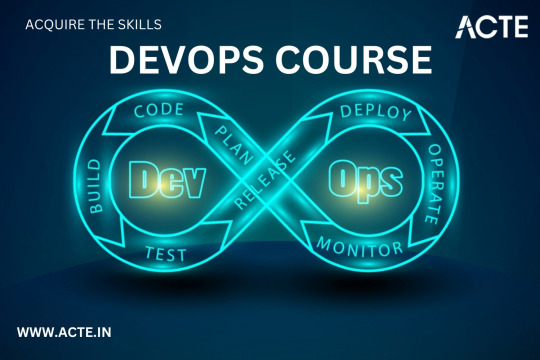
Key Components of Our DevOps Course
Our DevOps course is meticulously designed to provide you with a comprehensive understanding of the DevOps methodology and equip you with the necessary tools and techniques to excel in the field. Here are the key components you can expect to delve into during the course:
1. Understanding DevOps Fundamentals
Learn the core principles and concepts of DevOps, including continuous integration, continuous delivery, infrastructure automation, and collaboration techniques. Gain insights into how DevOps practices can enhance software development efficiency and communication within cross-functional teams.
2. Mastering Cloud Computing Technologies
Immerse yourself in cloud computing platforms like Amazon Web Services (AWS), Microsoft Azure, and Google Cloud Platform. Acquire hands-on experience in deploying applications, managing serverless architectures, and leveraging containerization technologies such as Docker and Kubernetes for scalable and efficient deployment.
3. Automating Infrastructure as Code
Discover the power of infrastructure automation through tools like Ansible, Terraform, and Puppet. Automate the provisioning, configuration, and management of infrastructure resources, enabling rapid scalability, agility, and error-free deployments.
4. Monitoring and Performance Optimization
Explore various monitoring and observability tools, including Elasticsearch, Grafana, and Prometheus, to ensure your applications are running smoothly and performing optimally. Learn how to diagnose and resolve performance bottlenecks, conduct efficient log analysis, and implement effective alerting mechanisms.
5. Embracing Continuous Integration and Delivery
Dive into the world of continuous integration and delivery (CI/CD) pipelines using popular tools like Jenkins, GitLab CI/CD, and CircleCI. Gain a deep understanding of how to automate build processes, run tests, and deploy applications seamlessly to achieve faster and more reliable software releases.
Reasons to Choose Our DevOps Course
There are numerous reasons why our DevOps course stands out from the rest. Here are some compelling factors that make it the ideal choice for aspiring software developers:
Expert Instructors: Learn from industry professionals who possess extensive experience in the field of DevOps and have a genuine passion for teaching. Benefit from their wealth of knowledge and practical insights gained from working on real-world projects.
Hands-On Approach: Our course emphasizes hands-on learning to ensure you develop the practical skills necessary to thrive in a DevOps environment. Through immersive lab sessions, you will have opportunities to apply the concepts learned and gain valuable experience working with industry-standard tools and technologies.
Tailored Curriculum: We understand that every learner is unique, so our curriculum is strategically designed to cater to individuals of varying proficiency levels. Whether you are a beginner or an experienced professional, our course will be tailored to suit your needs and help you achieve your desired goals.
Industry-Relevant Projects: Gain practical exposure to real-world scenarios by working on industry-relevant projects. Apply your newly acquired skills to solve complex problems and build innovative solutions that mirror the challenges faced by DevOps practitioners in the industry today.
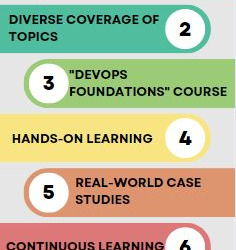
Benefits of Joining Our DevOps Course
By joining our DevOps course, you open up a world of benefits that will enhance your software development career. Here are some notable advantages you can expect to gain:
Enhanced Employability: Acquire sought-after skills that are in high demand in the software development industry. Stand out from the crowd and increase your employability prospects by showcasing your proficiency in DevOps methodologies and tools.
Higher Earning Potential: With the rise of DevOps practices, organizations are willing to offer competitive remuneration packages to skilled professionals. By mastering DevOps through our course, you can significantly increase your earning potential in the tech industry.
Streamlined Software Development Processes: Gain the ability to streamline software development workflows by effectively integrating development and operations. With DevOps expertise, you will be capable of accelerating software deployment, reducing errors, and improving the overall efficiency of the development lifecycle.
Continuous Learning and Growth: DevOps is a rapidly evolving field, and by joining our course, you become a part of a community committed to continuous learning and growth. Stay updated with the latest industry trends, technologies, and best practices to ensure your skills remain relevant in an ever-changing tech landscape.
In conclusion, our unique DevOps course at ACTE institute offers unparalleled opportunities for software developers to level up their skills and propel their careers forward. With a comprehensive curriculum, remarkable placement opportunities, and a host of benefits, joining our course is undoubtedly a wise investment in your future success. Don't miss out on this incredible chance to become a proficient DevOps practitioner and unlock new horizons in the world of software development. Enroll today and embark on an exciting journey towards professional growth and achievement!
10 notes
·
View notes
Text
Full Stack Development: Using DevOps and Agile Practices for Success
In today’s fast-paced and highly competitive tech industry, the demand for Full Stack Developers is steadily on the rise. These versatile professionals possess a unique blend of skills that enable them to handle both the front-end and back-end aspects of software development. However, to excel in this role and meet the ever-evolving demands of modern software development, Full Stack Developers are increasingly turning to DevOps and Agile practices. In this comprehensive guide, we will explore how the combination of Full Stack Development with DevOps and Agile methodologies can lead to unparalleled success in the world of software development.
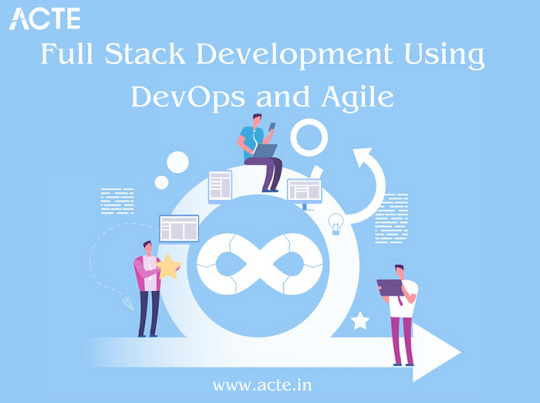
Full Stack Development: A Brief Overview
Full Stack Development refers to the practice of working on all aspects of a software application, from the user interface (UI) and user experience (UX) on the front end to server-side scripting, databases, and infrastructure on the back end. It requires a broad skill set and the ability to handle various technologies and programming languages.
The Significance of DevOps and Agile Practices
The environment for software development has changed significantly in recent years. The adoption of DevOps and Agile practices has become a cornerstone of modern software development. DevOps focuses on automating and streamlining the development and deployment processes, while Agile methodologies promote collaboration, flexibility, and iterative development. Together, they offer a powerful approach to software development that enhances efficiency, quality, and project success. In this blog, we will delve into the following key areas:
Understanding Full Stack Development
Defining Full Stack Development
We will start by defining Full Stack Development and elucidating its pivotal role in creating end-to-end solutions. Full Stack Developers are akin to the Swiss Army knives of the development world, capable of handling every aspect of a project.
Key Responsibilities of a Full Stack Developer
We will explore the multifaceted responsibilities of Full Stack Developers, from designing user interfaces to managing databases and everything in between. Understanding these responsibilities is crucial to grasping the challenges they face.
DevOps’s Importance in Full Stack Development
Unpacking DevOps
A collection of principles known as DevOps aims to eliminate the divide between development and operations teams. We will delve into what DevOps entails and why it matters in Full Stack Development. The benefits of embracing DevOps principles will also be discussed.
Agile Methodologies in Full Stack Development
Introducing Agile Methodologies
Agile methodologies like Scrum and Kanban have gained immense popularity due to their effectiveness in fostering collaboration and adaptability. We will introduce these methodologies and explain how they enhance project management and teamwork in Full Stack Development.
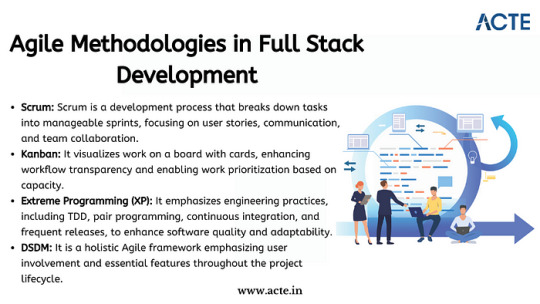
Synergy Between DevOps and Agile
The Power of Collaboration
We will highlight how DevOps and Agile practices complement each other, creating a synergy that streamlines the entire development process. By aligning development, testing, and deployment, this synergy results in faster delivery and higher-quality software.
Tools and Technologies for DevOps in Full Stack Development
Essential DevOps Tools
DevOps relies on a suite of tools and technologies, such as Jenkins, Docker, and Kubernetes, to automate and manage various aspects of the development pipeline. We will provide an overview of these tools and explain how they can be harnessed in Full Stack Development projects.
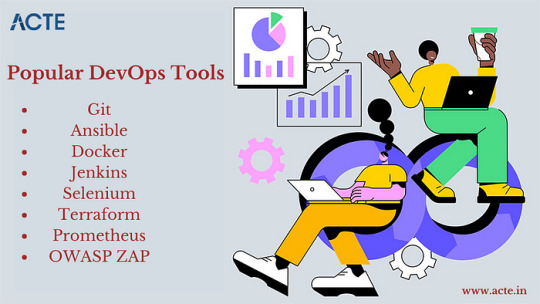
Implementing Agile in Full Stack Projects
Agile Implementation Strategies
We will delve into practical strategies for implementing Agile methodologies in Full Stack projects. Topics will include sprint planning, backlog management, and conducting effective stand-up meetings.
Best Practices for Agile Integration
We will share best practices for incorporating Agile principles into Full Stack Development, ensuring that projects are nimble, adaptable, and responsive to changing requirements.
Learning Resources and Real-World Examples
To gain a deeper understanding, ACTE Institute present case studies and real-world examples of successful Full Stack Development projects that leveraged DevOps and Agile practices. These stories will offer valuable insights into best practices and lessons learned. Consider enrolling in accredited full stack developer training course to increase your full stack proficiency.
Challenges and Solutions
Addressing Common Challenges
No journey is without its obstacles, and Full Stack Developers using DevOps and Agile practices may encounter challenges. We will identify these common roadblocks and provide practical solutions and tips for overcoming them.
Benefits and Outcomes
The Fruits of Collaboration
In this section, we will discuss the tangible benefits and outcomes of integrating DevOps and Agile practices in Full Stack projects. Faster development cycles, improved product quality, and enhanced customer satisfaction are among the rewards.
In conclusion, this blog has explored the dynamic world of Full Stack Development and the pivotal role that DevOps and Agile practices play in achieving success in this field. Full Stack Developers are at the forefront of innovation, and by embracing these methodologies, they can enhance their efficiency, drive project success, and stay ahead in the ever-evolving tech landscape. We emphasize the importance of continuous learning and adaptation, as the tech industry continually evolves. DevOps and Agile practices provide a foundation for success, and we encourage readers to explore further resources, courses, and communities to foster their growth as Full Stack Developers. By doing so, they can contribute to the development of cutting-edge solutions and make a lasting impact in the world of software development.
#web development#full stack developer#devops#agile#education#information#technology#full stack web development#innovation
2 notes
·
View notes
Text
CNAPP Explained: The Smartest Way to Secure Cloud-Native Apps with EDSPL

Introduction: The New Era of Cloud-Native Apps
Cloud-native applications are rewriting the rules of how we build, scale, and secure digital products. Designed for agility and rapid innovation, these apps demand security strategies that are just as fast and flexible. That’s where CNAPP—Cloud-Native Application Protection Platform—comes in.
But simply deploying CNAPP isn’t enough.
You need the right strategy, the right partner, and the right security intelligence. That’s where EDSPL shines.
What is CNAPP? (And Why Your Business Needs It)
CNAPP stands for Cloud-Native Application Protection Platform, a unified framework that protects cloud-native apps throughout their lifecycle—from development to production and beyond.
Instead of relying on fragmented tools, CNAPP combines multiple security services into a cohesive solution:
Cloud Security
Vulnerability management
Identity access control
Runtime protection
DevSecOps enablement
In short, it covers the full spectrum—from your code to your container, from your workload to your network security.
Why Traditional Security Isn’t Enough Anymore
The old way of securing applications with perimeter-based tools and manual checks doesn’t work for cloud-native environments. Here’s why:
Infrastructure is dynamic (containers, microservices, serverless)
Deployments are continuous
Apps run across multiple platforms
You need security that is cloud-aware, automated, and context-rich—all things that CNAPP and EDSPL’s services deliver together.
Core Components of CNAPP
Let’s break down the core capabilities of CNAPP and how EDSPL customizes them for your business:
1. Cloud Security Posture Management (CSPM)
Checks your cloud infrastructure for misconfigurations and compliance gaps.
See how EDSPL handles cloud security with automated policy enforcement and real-time visibility.
2. Cloud Workload Protection Platform (CWPP)
Protects virtual machines, containers, and functions from attacks.
This includes deep integration with application security layers to scan, detect, and fix risks before deployment.
3. CIEM: Identity and Access Management
Monitors access rights and roles across multi-cloud environments.
Your network, routing, and storage environments are covered with strict permission models.
4. DevSecOps Integration
CNAPP shifts security left—early into the DevOps cycle. EDSPL’s managed services ensure security tools are embedded directly into your CI/CD pipelines.
5. Kubernetes and Container Security
Containers need runtime defense. Our approach ensures zero-day protection within compute environments and dynamic clusters.
How EDSPL Tailors CNAPP for Real-World Environments
Every organization’s tech stack is unique. That’s why EDSPL never takes a one-size-fits-all approach. We customize CNAPP for your:
Cloud provider setup
Mobility strategy
Data center switching
Backup architecture
Storage preferences
This ensures your entire digital ecosystem is secure, streamlined, and scalable.
Case Study: CNAPP in Action with EDSPL
The Challenge
A fintech company using a hybrid cloud setup faced:
Misconfigured services
Shadow admin accounts
Poor visibility across Kubernetes
EDSPL’s Solution
Integrated CNAPP with CIEM + CSPM
Hardened their routing infrastructure
Applied real-time runtime policies at the node level
✅ The Results
75% drop in vulnerabilities
Improved time to resolution by 4x
Full compliance with ISO, SOC2, and GDPR
Why EDSPL’s CNAPP Stands Out
While most providers stop at integration, EDSPL goes beyond:
🔹 End-to-End Security: From app code to switching hardware, every layer is secured. 🔹 Proactive Threat Detection: Real-time alerts and behavior analytics. 🔹 Customizable Dashboards: Unified views tailored to your team. 🔹 24x7 SOC Support: With expert incident response. 🔹 Future-Proofing: Our background vision keeps you ready for what’s next.
EDSPL’s Broader Capabilities: CNAPP and Beyond
While CNAPP is essential, your digital ecosystem needs full-stack protection. EDSPL offers:
Network security
Application security
Switching and routing solutions
Storage and backup services
Mobility and remote access optimization
Managed and maintenance services for 24x7 support
Whether you’re building apps, protecting data, or scaling globally, we help you do it securely.
Let’s Talk CNAPP
You’ve read the what, why, and how of CNAPP — now it’s time to act.
📩 Reach us for a free CNAPP consultation. 📞 Or get in touch with our cloud security specialists now.
Secure your cloud-native future with EDSPL — because prevention is always smarter than cure.
0 notes
Text
Enterprise Kubernetes Storage with Red Hat OpenShift Data Foundation (DO370)
In the era of cloud-native transformation, data is the fuel powering everything from mission-critical enterprise apps to real-time analytics platforms. However, as Kubernetes adoption grows, many organizations face a new set of challenges: how to manage persistent storage efficiently, reliably, and securely across distributed environments.
To solve this, Red Hat OpenShift Data Foundation (ODF) emerges as a powerful solution — and the DO370 training course is designed to equip professionals with the skills to deploy and manage this enterprise-grade storage platform.
🔍 What is Red Hat OpenShift Data Foundation?
OpenShift Data Foundation is an integrated, software-defined storage solution that delivers scalable, resilient, and cloud-native storage for Kubernetes workloads. Built on Ceph and Rook, ODF supports block, file, and object storage within OpenShift, making it an ideal choice for stateful applications like databases, CI/CD systems, AI/ML pipelines, and analytics engines.
🎯 Why Learn DO370?
The DO370: Red Hat OpenShift Data Foundation course is specifically designed for storage administrators, infrastructure architects, and OpenShift professionals who want to:
✅ Deploy ODF on OpenShift clusters using best practices.
✅ Understand the architecture and internal components of Ceph-based storage.
✅ Manage persistent volumes (PVs), storage classes, and dynamic provisioning.
✅ Monitor, scale, and secure Kubernetes storage environments.
✅ Troubleshoot common storage-related issues in production.
🛠️ Key Features of ODF for Enterprise Workloads
1. Unified Storage (Block, File, Object)
Eliminate silos with a single platform that supports diverse workloads.
2. High Availability & Resilience
ODF is designed for fault tolerance and self-healing, ensuring business continuity.
3. Integrated with OpenShift
Full integration with the OpenShift Console, Operators, and CLI for seamless Day 1 and Day 2 operations.
4. Dynamic Provisioning
Simplifies persistent storage allocation, reducing manual intervention.
5. Multi-Cloud & Hybrid Cloud Ready
Store and manage data across on-prem, public cloud, and edge environments.
📘 What You Will Learn in DO370
Installing and configuring ODF in an OpenShift environment.
Creating and managing storage resources using the OpenShift Console and CLI.
Implementing security and encryption for data at rest.
Monitoring ODF health with Prometheus and Grafana.
Scaling the storage cluster to meet growing demands.
🧠 Real-World Use Cases
Databases: PostgreSQL, MySQL, MongoDB with persistent volumes.
CI/CD: Jenkins with persistent pipelines and storage for artifacts.
AI/ML: Store and manage large datasets for training models.
Kafka & Logging: High-throughput storage for real-time data ingestion.
👨🏫 Who Should Enroll?
This course is ideal for:
Storage Administrators
Kubernetes Engineers
DevOps & SRE teams
Enterprise Architects
OpenShift Administrators aiming to become RHCA in Infrastructure or OpenShift
🚀 Takeaway
If you’re serious about building resilient, performant, and scalable storage for your Kubernetes applications, DO370 is the must-have training. With ODF becoming a core component of modern OpenShift deployments, understanding it deeply positions you as a valuable asset in any hybrid cloud team.
🧭 Ready to transform your Kubernetes storage strategy? Enroll in DO370 and master Red Hat OpenShift Data Foundation today with HawkStack Technologies – your trusted Red Hat Certified Training Partner. For more details www.hawkstack.com
0 notes
Text
Best Software Development Company in Chennai | Leading Software Solutions

When searching for the best software development company in Chennai, businesses of all sizes look for a partner who combines technical expertise, a customer-centric approach, and proven delivery. A leading Software Development Company in Chennai offers end-to-end solutions—from ideation and design to development, testing, deployment, and maintenance—ensuring your software is scalable, secure, and aligned with your strategic goals.
Why Choose the Best Software Development Company in Chennai?
Local Expertise, Global Standards Chennai has emerged as a thriving IT hub, home to talented engineers fluent in cutting-edge technologies. By selecting the best software development company in Chennai, you tap into deep local expertise guided by global best practices, ensuring your project stays on time and within budget.
Proven Track Record The top Software Development Company in Chennai showcases a rich portfolio of successful projects across industries—finance, healthcare, e-commerce, education, and more. Their case studies demonstrate on-point requirements gathering, agile delivery, and robust support.
Cost-Effective Solutions Chennai offers competitive rates without compromising quality. The best software development company in Chennai provides flexible engagement models—fixed price, time & materials, or dedicated teams—so you can choose the structure that best fits your budget and timeline.
Cultural Alignment & Communication Teams in Chennai often work in overlapping time zones with North America, Europe, and Australia, enabling real-time collaboration. A leading Software Development Company in Chennai emphasizes transparent communication, regular status updates, and seamless integration with your in-house team.
Core Services Offered
A comprehensive Software Development Company in Chennai typically delivers:
Custom Software Development Tailor-made applications built from the ground up to address unique business challenges—whether it’s a CRM, ERP, inventory system, or specialized B2B software.
Mobile App Development Native and cross-platform iOS/Android apps designed for performance, usability, and engagement. Ideal for startups and enterprises aiming to reach customers on the go.
Web Application Development Responsive, SEO-friendly, and secure web apps using frameworks like React, Angular, and Vue.js, backed by scalable back-end systems in Node.js, .NET, Java, or Python.
UI/UX Design User-centered design that drives adoption. Wireframes, prototypes, and high-fidelity designs ensure an intuitive interface that delights end users.
Quality Assurance & Testing Automated and manual testing—functional, performance, security, and usability—to deliver a bug-free product that scales under real-world conditions.
DevOps & Cloud Services CI/CD pipelines, containerization with Docker/Kubernetes, and deployments on AWS, Azure, or Google Cloud for high availability and rapid release cycles.
Maintenance & Support Post-launch monitoring, feature enhancements, and 24/7 support to keep your software running smoothly and securely.
The Development Process
Discovery & Planning Workshops and stakeholder interviews to define scope, objectives, and success metrics.
Design & Prototyping Rapid prototyping of wireframes and UI mockups for early feedback and iterative refinement.
Agile Development Two-week sprints with sprint demos, ensuring transparency and adaptability to changing requirements.
Testing & QA Continuous testing throughout development to catch issues early and deliver a stable release.
Deployment & Go-Live Seamless rollout with thorough planning, user training, and post-deployment support.
Maintenance & Evolution Ongoing enhancements, performance tuning, and security updates to keep your application competitive.
Benefits of Partnering Locally
Speedy Onboarding: Proximity to Chennai’s tech ecosystem speeds up recruitment of additional talent.
Cultural Synergy: Shared cultural context helps in understanding your business nuances faster.
Time-Zone Overlap: Real-time collaboration during key business hours reduces turnaround times.
Networking & Events: Access to local tech meetups, hackathons, and startup incubators for continuous innovation.
Conclusion
Choosing the best software development company in Chennai means entrusting your digital transformation to a partner with deep technical skills, transparent processes, and a client-first ethos. Whether you’re a startup looking to disrupt the market or a large enterprise aiming to modernize legacy systems, the right Software Development Company in Chennai will guide you from concept to success—delivering high-quality software on schedule and within budget. Start your journey today and experience why Chennai stands out as a premier destination for software development excellence.
0 notes
Text
Scaling Your Australian Business with AI: A CEO’s Guide to Hiring Developers
In today’s fiercely competitive digital economy, innovation isn’t a luxury—it’s a necessity. Australian businesses are increasingly recognizing the transformative power of Artificial Intelligence (AI) to streamline operations, enhance customer experiences, and unlock new revenue streams. But to fully harness this potential, one crucial element is required: expert AI developers.
Whether you’re a fast-growing fintech in Sydney or a manufacturing giant in Melbourne, if you’re looking to implement scalable AI solutions, the time has come to hire AI developers who understand both the technology and your business landscape.
In this guide, we walk CEOs, CTOs, and tech leaders through the essentials of hiring AI talent to scale operations effectively and sustainably.

Why AI is Non-Negotiable for Scaling Australian Enterprises
Australia has seen a 270% rise in AI adoption across key industries like retail, healthcare, logistics, and finance over the past three years. From predictive analytics to conversational AI and intelligent automation, AI has become central to delivering scalable, data-driven solutions.
According to Deloitte Access Economics, AI is expected to contribute AU$ 22.17 billion to the Australian economy by 2030. For CEOs and decision-makers, this isn’t just a trend—it’s a wake-up call to start investing in the right AI talent to stay relevant.
The Hidden Costs of Delaying AI Hiring
Still relying on a traditional tech team to handle AI-based initiatives? You could be leaving significant ROI on the table. Without dedicated experts, your AI projects risk:
Delayed deployments
Poorly optimized models
Security vulnerabilities
Lack of scalability
Wasted infrastructure investment
By choosing to hire AI developers, you're enabling faster time-to-market, more accurate insights, and a competitive edge in your sector.
How to Hire AI Developers: A Strategic Approach for Australian CEOs
The process of hiring AI developers is unlike standard software recruitment. You’re not just hiring a coder—you’re bringing on board an innovation partner.
Here’s what to consider:
1. Define the Scope of AI in Your Business
Before hiring, map out where AI fits in your roadmap:
Are you looking for machine learning-driven forecasting?
Want to implement AI chatbots for 24/7 customer service?
Building a computer vision solution for your manufacturing line?
Once you identify the use cases, it becomes easier to hire ML developers or AI experts with the relevant domain and technical experience.
2. Understand the AI Tech Stack
A strong AI developer should be proficient in:
Python, R, TensorFlow, PyTorch
Scikit-learn, Keras, OpenCV
Data engineering with SQL, Spark, Hadoop
Deployment tools like Docker, Kubernetes, AWS SageMaker
When you hire remote AI engineers, ensure they’re fluent not just in coding, but also in AI deployment and scalability best practices.
3. Consider AI Developer Augmentation for Speed & Flexibility
Building an in-house AI team is time-consuming and expensive. That’s why AI developer staff augmentation is a smarter choice for many Australian enterprises.
With our staff augmentation services, you can:
Access pre-vetted, highly skilled AI developers
Scale up or down depending on your project phase
Save costs on infrastructure and training
Retain full control over your development process
Whether you need to hire ML developers for short-term analytics or long-term AI product development, we offer customized engagement models to suit your needs.
4. Prioritize Industry Experience
AI isn’t one-size-fits-all. Hiring developers who have experience in your specific industry—be it healthcare, fintech, ecommerce, logistics, or manufacturing—ensures faster onboarding and better results.
We’ve helped companies in Australia and across the globe integrate AI into:
Predictive maintenance systems
Smart supply chain analytics
AI-based fraud detection in banking
Personalized customer experiences in ecommerce
This hands-on experience allows our developers to deliver solutions that are relevant and ROI-driven.
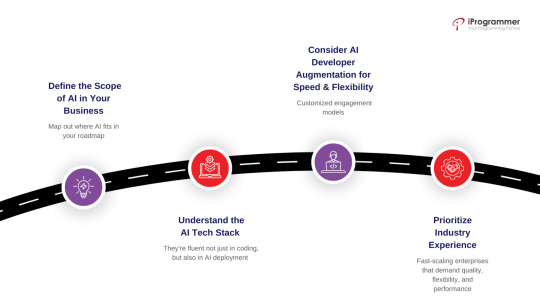
Why Choose Our AI Developer Staff Augmentation Services?
At iProgrammer, we bring over a decade of experience in empowering businesses through intelligent technology solutions. Our AI developer augmentation services are designed for fast-scaling enterprises that demand quality, flexibility, and performance.
What Sets Us Apart:
AI-First Talent Pool: We don’t generalize. We specialize in AI, ML, NLP, computer vision, and data science.
Quick Deployment: Get developers onboarded and contributing in just a few days.
Cost Efficiency: Hire remote AI developers from our offshore team and reduce development costs by up to 40%.
End-to-End Support: From hiring to integration and project execution, we stay involved to ensure success.
A Case in Point: AI Developer Success in an Australian Enterprise
One of our clients, a mid-sized logistics company in Brisbane, wanted to predict delivery delays using real-time data. Within 3 weeks of engagement, we onboarded a senior ML developer who built a predictive model using historical shipment data, weather feeds, and traffic APIs. The result? A 25% reduction in customer complaints and a 15% improvement in delivery time accuracy.
This is the power of hiring the right AI developer at the right time.
Final Thoughts: CEOs Must Act Now to Stay Ahead
If you’re a CEO, CTO, or decision-maker in Australia, the question isn’t “Should I hire AI developers?” It’s “How soon can I hire the right AI developer to scale my business?”
Whether you're launching your first AI project or scaling an existing system, AI developer staff augmentation provides the technical depth and agility you need to grow fast—without the friction of long-term hiring.
Ready to Build Your AI Dream Team?
Let’s connect. Talk to our AI staffing experts today and discover how we can help you hire remote AI developers or hire ML developers who are ready to make an impact from day one.
👉 Contact Us Now | Schedule a Free Consultation
0 notes
Text
Powering Progress – Why an IT Solutions Company India Should Be Your Technology Partner
In today’s hyper‑connected world, agile technology is the backbone of every successful enterprise. From cloud migrations to cybersecurity fortresses, an IT Solutions Company India has become the go‑to partner for businesses of every size. India’s IT sector, now worth over USD 250 billion, delivers world‑class solutions at unmatched value, helping startups and Fortune 500 firms alike turn bold ideas into reality.
1 | A Legacy of Tech Excellence
The meteoric growth of the Indian IT industry traces back to the early 1990s when reform policies sparked global outsourcing. Three decades later, an IT Solutions Company India is no longer a mere offshore vendor but a full‑stack innovation hub. Indian engineers lead global code commits on GitHub, contribute to Kubernetes and TensorFlow, and spearhead R&D in AI, blockchain, and IoT.
2 | Comprehensive Service Portfolio
Your business can tap into an integrated bouquet of services without juggling multiple vendors:
Custom Software Development – Agile sprints, DevOps pipelines, and rigorous QA cycles ensure robust, scalable products.
Cloud & DevOps – Migrate legacy workloads to AWS, Azure, or GCP and automate deployments with Jenkins, Docker, and Kubernetes.
Cybersecurity & Compliance – SOC 2, ISO 27001, GDPR: an IT Solutions Company India hardens your defenses and meets global regulations.
Data Analytics & AI – Transform raw data into actionable insights using ML algorithms, predictive analytics, and BI dashboards.
Managed IT Services – 24×7 monitoring, incident response, and helpdesk support slash downtime and boost productivity.
3 | Why India Wins on the Global Stage
Talent Pool – Over four million skilled technologists graduate each year.
Cost Efficiency – Competitive rates without compromising quality.
Time‑Zone Advantage – Overlapping work windows enable real‑time collaboration with APAC, EMEA, and the Americas.
Innovation Culture – Government initiatives like “Digital India” and “Startup India” fuel continuous R&D.
Proven Track Record – Case studies show a 40‑60 % reduction in TCO after partnering with an IT Solutions Company India.
4 | Success Story Snapshot
A U.S. healthcare startup needed HIPAA‑compliant telemedicine software within six months. Partnering with an IT Solutions Company India, they:
Deployed a microservices architecture on AWS using Terraform
Integrated real‑time video via WebRTC with 99.9 % uptime
Achieved HIPAA compliance in the first audit cycle The result? A 3× increase in user adoption and Series B funding secured in record time.
5 | Engagement Models to Fit Every Need
Dedicated Development Team – Ideal for long‑term projects needing continuous innovation.
Fixed‑Scope, Fixed‑Price – Best for clearly defined deliverables and budgets.
Time & Material – Flexibility for evolving requirements and rapid pivots.
6 | Future‑Proofing Your Business
Technologies like edge AI, quantum computing, and 6G will reshape industries. By aligning with an IT Solutions Company India, you gain a strategic partner who anticipates disruptions and prototypes tomorrow’s solutions today.
7 | Call to Action
Ready to accelerate digital transformation? Choose an IT Solutions Company India that speaks the language of innovation, agility, and ROI. Schedule a free consultation and turn your tech vision into a competitive edge.
Plot No 9, Sarwauttam Complex, Manwakheda Road,Anand Vihar, Behind Vaishali Apartment, Sector 4, Hiran Magri, Udaipur, Udaipur, Rajasthan 313002
1 note
·
View note
Text
Building Scalable Web Applications with ASP.NET Core
In the ever-evolving world of web development, building applications that can grow with user demand is critical. ASP.NET Core, Microsoft’s powerful open-source framework, is trusted by developers worldwide to create high-performance, scalable web solutions. To gain hands-on expertise in this robust framework, consider enrolling at the Best DotNet Training Institute in Hyderabad, Kukatpally, KPHB, where expert instructors and practical sessions help turn learners into professionals.
Why Choose ASP.NET Core for Scalable Apps?
ASP.NET Core stands out due to its modern architecture and performance-first approach. It’s lightweight, modular, and built from the ground up to support cloud-based and enterprise-level applications.
Cross-Platform Development: Write once, deploy anywhere—Windows, Linux, or macOS.
An efficient web framework: It's one of the fastest frameworks on the market.
Microservices Ready: Easily build and manage microservices with Docker and Kubernetes support.
Core Features Supporting Scalability
Asynchronous Programming
ASP.NET Core's support for asynchronous programming allows applications to handle multiple requests efficiently, minimizing latency even under high loads.
Built-in Dependency Injection
This helps manage complex application dependencies cleanly, allowing better control and scalability.
Middleware Pipeline
Customize the request-response pipeline to ensure efficient data handling, performance tuning, and modular control.
Integration with Modern Tools and Cloud Platforms
ASP.NET Core seamlessly integrates with:
Azure Cloud Services for flexible deployment and scalability.
Entity Framework Core for efficient data access.
SignalR for real-time web functionalities.
Front-end libraries like Angular and React for building full-stack applications.
These integrations empower developers to build feature-rich, cloud-native applications that scale as user demand grows.
Community Support and Continued Growth
ASP.NET Core benefits from a strong global developer community and regular updates from Microsoft. You’ll find thousands of tutorials, forums, and open-source projects that accelerate your learning and problem-solving.
Conclusion
Developing scalable web applications is no longer optional-it's a fundamental requirement. ASP.NET Core offers the flexibility, performance, and tools needed to build apps that grow with your business. To truly master it and launch a rewarding development career, consider training with Monopoly IT Solutions, where real-world projects, expert trainers, and career guidance await.
#best dotnet training in hyderabad#best dotnet training in kukatpally#best dotnet training in kphb#best .net full stack training
0 notes
Text
Embarking on a Digital Journey: Your Guide to Learning Coding
In today's fast-paced and ever-evolving technology landscape, DevOps has emerged as a crucial and transformative field that bridges the gap between software development and IT operations. The term "DevOps" is a portmanteau of "Development" and "Operations," emphasizing the importance of collaboration, automation, and efficiency in the software delivery process. DevOps practices have gained widespread adoption across industries, revolutionizing the way organizations develop, deploy, and maintain software. This paradigm shift has led to a surging demand for skilled DevOps professionals who can navigate the complex and multifaceted DevOps landscape.

Exploring DevOps Job Opportunities
DevOps has given rise to a spectrum of job opportunities, each with its unique focus and responsibilities. Let's delve into some of the key DevOps roles that are in high demand:
1. DevOps Engineer
At the heart of DevOps lies the DevOps engineer, responsible for automating and streamlining IT operations and processes. DevOps engineers are the architects of efficient software delivery pipelines, collaborating closely with development and IT teams. Their mission is to accelerate the software delivery process while ensuring the reliability and stability of systems.
2. Site Reliability Engineer (SRE)
Site Reliability Engineers, or SREs, are a subset of DevOps engineers who specialize in maintaining large-scale, highly reliable software systems. They focus on critical aspects such as availability, latency, performance, efficiency, change management, monitoring, emergency response, and capacity planning. SREs play a pivotal role in ensuring that applications and services remain dependable and performant.
3. Automation Architect
Automation is a cornerstone of DevOps, and automation architects are experts in this domain. These professionals design and implement automation solutions that optimize software development and delivery processes. By automating repetitive and manual tasks, they enhance efficiency and reduce the risk of human error.
4. Continuous Integration/Continuous Deployment (CI/CD) Engineer
CI/CD engineers specialize in creating, maintaining, and optimizing CI/CD pipelines. The CI/CD pipeline is the backbone of DevOps, enabling the automated building, testing, and deployment of code. CI/CD engineers ensure that the pipeline operates seamlessly, enabling rapid and reliable software delivery.
5. Containerization Specialist
The rise of containerization technologies like Docker and orchestration tools such as Kubernetes has revolutionized software deployment. Containerization specialists focus on managing and scaling containerized applications, making them an integral part of DevOps teams.
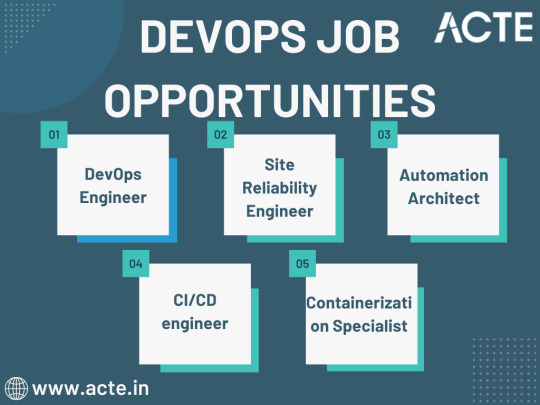
Navigating the DevOps Learning Journey
To embark on a successful DevOps career, individuals often turn to comprehensive training programs and courses that equip them with the necessary skills and knowledge. The DevOps learning journey typically involves the following courses:
1. DevOps Foundation
A foundational DevOps course covers the basics of DevOps practices, principles, and tools. It serves as an excellent starting point for beginners, providing a solid understanding of the DevOps mindset and practices.
2. DevOps Certification
Advanced certification courses are designed for those who wish to delve deeper into DevOps methodologies, CI/CD pipelines, and various tools like Jenkins, Ansible, and Terraform. These certifications validate your expertise and enhance your job prospects.
3. Docker and Kubernetes Training
Containerization and container orchestration are two essential skills in the DevOps toolkit. Courses focused on Docker and Kubernetes provide in-depth knowledge of these technologies, enabling professionals to effectively manage containerized applications.
4. AWS or Azure DevOps Training
Specialized DevOps courses tailored to cloud platforms like AWS or Azure are essential for those working in a cloud-centric environment. These courses teach how to leverage cloud services in a DevOps context, further streamlining software development and deployment.
5. Advanced DevOps Courses
For those looking to specialize in specific areas, advanced DevOps courses cover topics like DevOps security, DevOps practices for mobile app development, and more. These courses cater to professionals who seek to expand their expertise in specific domains.
As the DevOps landscape continues to evolve, the need for high-quality training and education becomes increasingly critical. This is where ACTE Technologies steps into the spotlight as a reputable choice for comprehensive DevOps training.
They offer carefully thought-out courses that are intended to impart both foundational information and real-world, practical experience. Under the direction of knowledgeable educators, students can quickly advance on their path to become skilled DevOps engineers. They provide practical insights into industrial practises and issues, going beyond theory.
Your journey toward mastering DevOps practices and pursuing a successful career begins here. In the digital realm, where possibilities are limitless and innovation knows no bounds, ACTE Technologies serves as a gateway to a thriving DevOps career. With a diverse array of courses and expert instruction, you'll find the resources you need to thrive in this ever-evolving domain.
3 notes
·
View notes
Text
Legacy Software Modernization Services In India – NRS Infoways
In today’s hyper‑competitive digital landscape, clinging to outdated systems is no longer an option. Legacy applications can slow innovation, inflate maintenance costs, and expose your organization to security vulnerabilities. NRS Infoways bridges the gap between yesterday’s technology and tomorrow’s possibilities with comprehensive Software Modernization Services In India that revitalize your core systems without disrupting day‑to‑day operations.
Why Modernize?
Boost Performance & Scalability
Legacy architectures often struggle under modern workloads. By re‑architecting or migrating to cloud‑native frameworks, NRS Infoways unlocks the flexibility you need to scale on demand and handle unpredictable traffic spikes with ease.
Reduce Technical Debt
Old codebases are costly to maintain. Our experts refactor critical components, streamline dependencies, and implement automated testing pipelines, dramatically lowering long‑term maintenance expenses.
Strengthen Security & Compliance
Obsolete software frequently harbors unpatched vulnerabilities. We embed industry‑standard security protocols and data‑privacy controls to safeguard sensitive information and keep you compliant with evolving regulations.
Enhance User Experience
Customers expect snappy, intuitive interfaces. We upgrade clunky GUIs into sleek, responsive designs—whether for web, mobile, or enterprise portals—boosting user satisfaction and retention.
Our Proven Modernization Methodology
1. Deep‑Dive Assessment
We begin with an exhaustive audit of your existing environment—code quality, infrastructure, DevOps maturity, integration points, and business objectives. This roadmap pinpoints pain points, ranks priorities, and plots the most efficient modernization path.
2. Strategic Planning & Architecture
Armed with data, we design a future‑proof architecture. Whether it’s containerization with Docker/Kubernetes, serverless microservices, or hybrid-cloud setups, each blueprint aligns performance goals with budget realities.
3. Incremental Refactoring & Re‑engineering
To mitigate risk, we adopt a phased approach. Modules are refactored or rewritten in modern languages—often leveraging Java Spring Boot, .NET Core, or Node.js—while maintaining functional parity. Continuous integration pipelines ensure rapid, reliable deployments.
4. Data Migration & Integration
Smooth, loss‑less data transfer is critical. Our team employs advanced ETL processes and secure APIs to migrate databases, synchronize records, and maintain interoperability with existing third‑party solutions.
5. Rigorous Quality Assurance
Automated unit, integration, and performance tests catch issues early. Penetration testing and vulnerability scans validate that the revamped system meets stringent security and compliance benchmarks.
6. Go‑Live & Continuous Support
Once production‑ready, we orchestrate a seamless rollout with minimal downtime. Post‑deployment, NRS Infoways provides 24 × 7 monitoring, performance tuning, and incremental enhancements so your modernized platform evolves alongside your business.
Key Differentiators
Domain Expertise: Two decades of transforming systems across finance, healthcare, retail, and logistics.
Certified Talent: AWS, Azure, and Google Cloud‑certified architects ensure best‑in‑class cloud adoption.
DevSecOps Culture: Security baked into every phase, backed by automated vulnerability management.
Agile Engagement Models: Fixed‑scope, time‑and‑material, or dedicated team options adapt to your budget and timeline.
Result‑Driven KPIs: We measure success via reduced TCO, improved response times, and tangible ROI, not just code delivery.
Success Story Snapshot
A leading Indian logistics firm grappled with a decade‑old monolith that hindered real‑time shipment tracking. NRS Infoways migrated the application to a microservices architecture on Azure, consolidating disparate data silos and introducing RESTful APIs for third‑party integrations. The results? A 40 % reduction in server costs, 60 % faster release cycles, and a 25 % uptick in customer satisfaction scores within six months.
Future‑Proof Your Business Today
Legacy doesn’t have to mean liability. With NRS Infoways’ Legacy Software Modernization Services In India, you gain a robust, scalable, and secure foundation ready to tackle tomorrow’s challenges—whether that’s AI integration, advanced analytics, or global expansion.
Ready to transform?
Contact us for a free modernization assessment and discover how our Software Modernization Services In India can accelerate your digital journey, boost operational efficiency, and drive sustainable growth.
0 notes
Text
IT Staff Augmentation Services | Staff Augmentation Company
In today’s fast-paced digital world, technology evolves rapidly—and so does the need for top IT talent. Companies are constantly seeking efficient, scalable, and cost-effective ways to expand their tech teams without bearing the long-term burden of hiring full-time employees. This is where IT staff augmentation services come into play.
At Versatile IT Solutions, we offer flexible and customized IT staff augmentation to meet your short-term or long-term project demands. With over 12+ years of industry experience, we help companies of all sizes find the right talent, fast—without compromising quality.
What Is IT Staff Augmentation?
IT Staff Augmentation is a strategic outsourcing model that allows you to hire skilled tech professionals on-demand to fill temporary or project-based roles within your organization. This model helps bridge skill gaps, scale teams quickly, and improve operational efficiency without the complexities of permanent hiring.
Whether you need software developers, QA engineers, UI/UX designers, DevOps experts, or cloud specialists, Versatile IT Solutions has a ready pool of vetted professionals to meet your unique business needs.
Why Choose Versatile IT Solutions?
Versatile IT Solutions stands out as a reliable staff augmentation company because of our deep understanding of technology, rapid talent deployment capabilities, and commitment to quality.
✅ Key Highlights:
12+ Years of Experience in IT consulting and workforce solutions
300+ Successful Client Engagements across the USA, UK, UAE, and India
Pre-vetted Tech Talent in various domains and technologies
Flexible Engagement Models: Hourly, monthly, or project-based
Fast Onboarding & Deployment within 24–72 hours
Compliance-Ready staffing for international standards
We don’t just provide resumes—we deliver professionals who are culture-fit, project-ready, and aligned with your objectives.
Our IT Staff Augmentation Services
We offer comprehensive staff augmentation solutions that allow companies to hire qualified IT professionals on demand. Some of our key offerings include:
1. Contract Developers
Hire experienced developers skilled in technologies like Java, Python, PHP, Node.js, React, Angular, and more to strengthen your software development lifecycle.
2. Dedicated Project Teams
Get entire project teams—including developers, testers, designers, and project managers—for end-to-end execution.
3. Cloud & DevOps Engineers
Need help with infrastructure or deployment? Augment your IT team with certified AWS, Azure, or Google Cloud professionals.
4. QA & Automation Testing Experts
Our testing professionals ensure product reliability with both manual and automated testing capabilities.
5. UI/UX Designers
Enhance your product’s user experience with creative UI/UX professionals skilled in tools like Figma, Sketch, and Adobe XD.
6. ERP & CRM Specialists
Staff your enterprise solutions with SAP, Salesforce, and Microsoft Dynamics experts.
Technologies We Support
We cater to a wide array of platforms and technologies:
Front-End: React.js, Angular, Vue.js
Back-End: Node.js, .NET, Java, Python, PHP
Mobile: Android, iOS, Flutter, React Native
Cloud: AWS, Azure, GCP
DevOps: Docker, Kubernetes, Jenkins, Ansible
Database: MySQL, MongoDB, PostgreSQL, Oracle
ERP/CRM: SAP, Salesforce, Microsoft Dynamics
Engagement Models
We offer flexibility with our hiring models to best suit your project and budget requirements:
Hourly Basis – Ideal for short-term needs
Monthly Contracts – Great for ongoing or long-term projects
Dedicated Teams – For businesses needing focused delivery from a committed team
Whether you want to scale up quickly for a new project or need niche expertise to complement your internal team, our adaptable models ensure smooth onboarding and integration.
Benefits of IT Staff Augmentation
Hiring through a trusted staff augmentation partner like Versatile IT Solutions comes with numerous advantages:
🔹 Cost-Effective Resource Allocation
🔹 No Long-Term Hiring Commitments
🔹 Access to Global Talent Pool
🔹 Faster Time-to-Market
🔹 Reduced Overhead Costs
🔹 Control Over Project Workflow
Instead of spending months on hiring and training, you can deploy top tech talent within days and keep your business moving forward.
Client Success Story
“We needed a team of skilled backend developers for a critical fintech project. Versatile delivered high-quality professionals within a week. They were proactive, collaborative, and technically strong.” — CTO, US-Based Fintech Company
“Thanks to Versatile's staff augmentation services, we were able to reduce our time to market by 40%. Their resources seamlessly integrated with our in-house team.” — Head of Product, SaaS Startup
Ready to Augment Your IT Team?
If you're struggling with hiring delays, talent shortages, or capacity issues, Versatile IT Solutions is here to help. We offer customized IT staff augmentation services that let you scale smarter, faster, and more efficiently.
📌 Explore our Staff Augmentation Services 📌 Need expert advice or want to get started?
#IT Staff Augmentation#Tech Talent Hiring#Software Developers#Dedicated Teams#Versatile IT Solutions#Resource Augmentation#Remote Developers#DevOps Engineers
0 notes